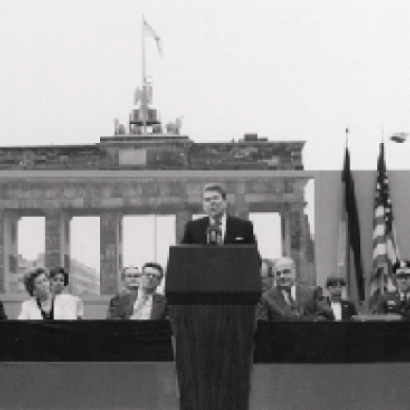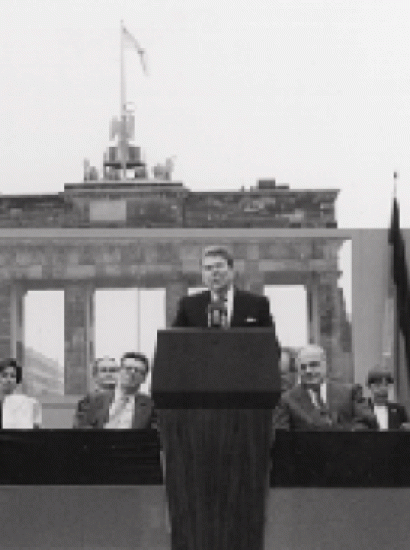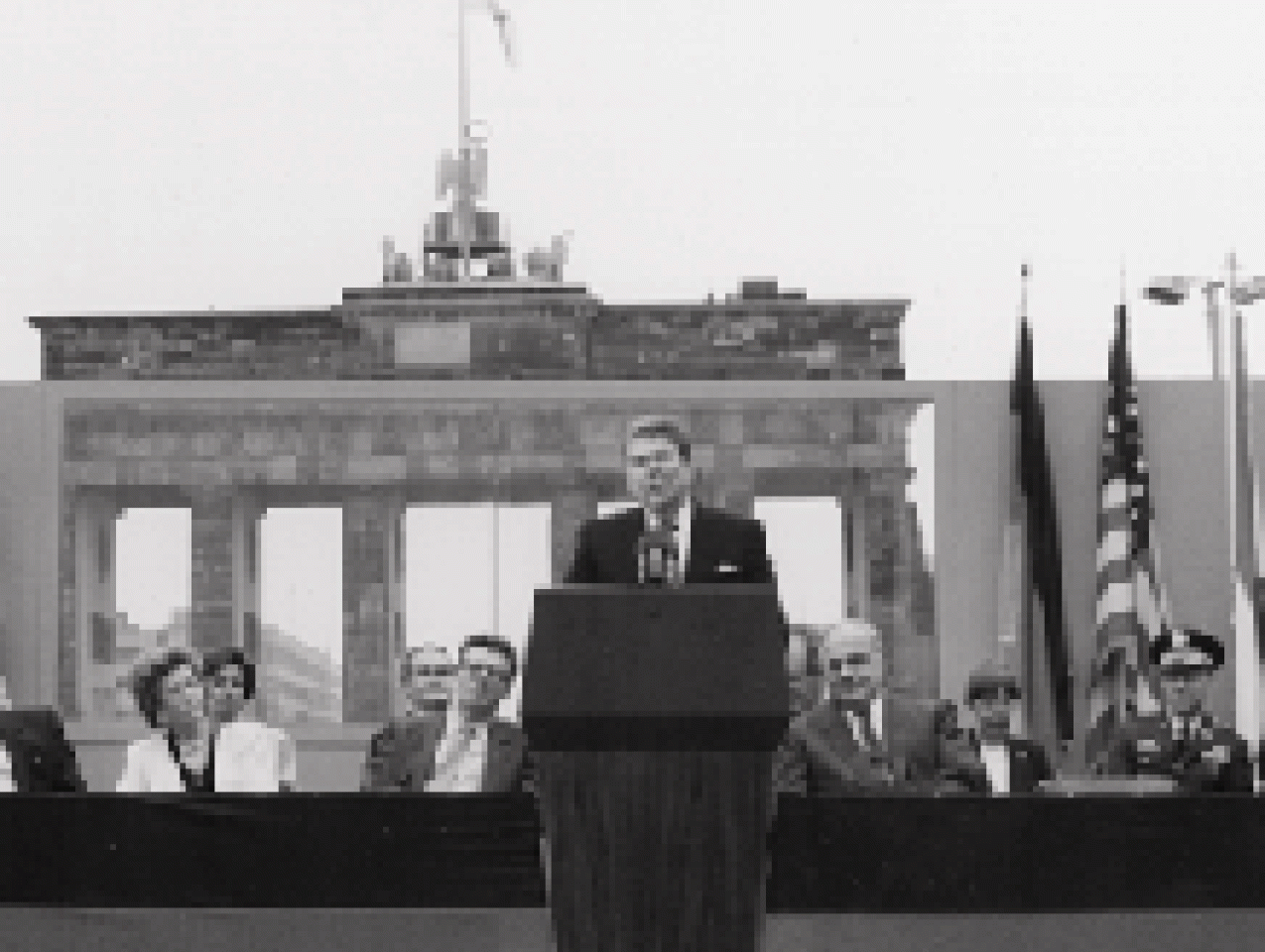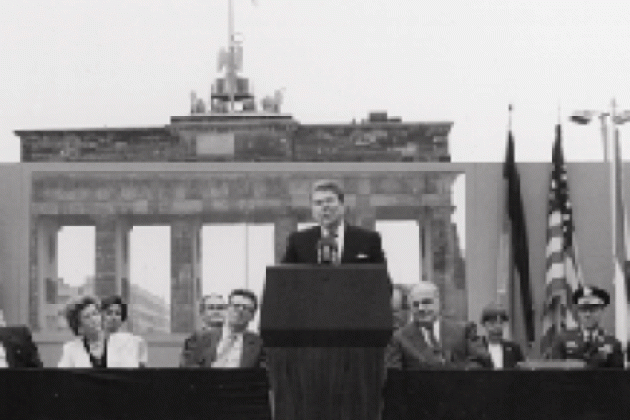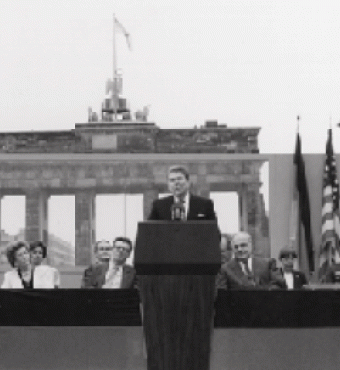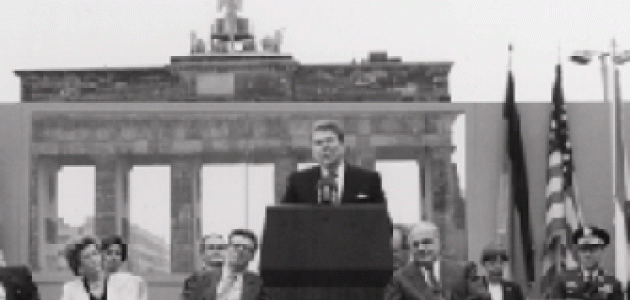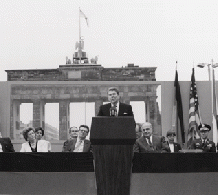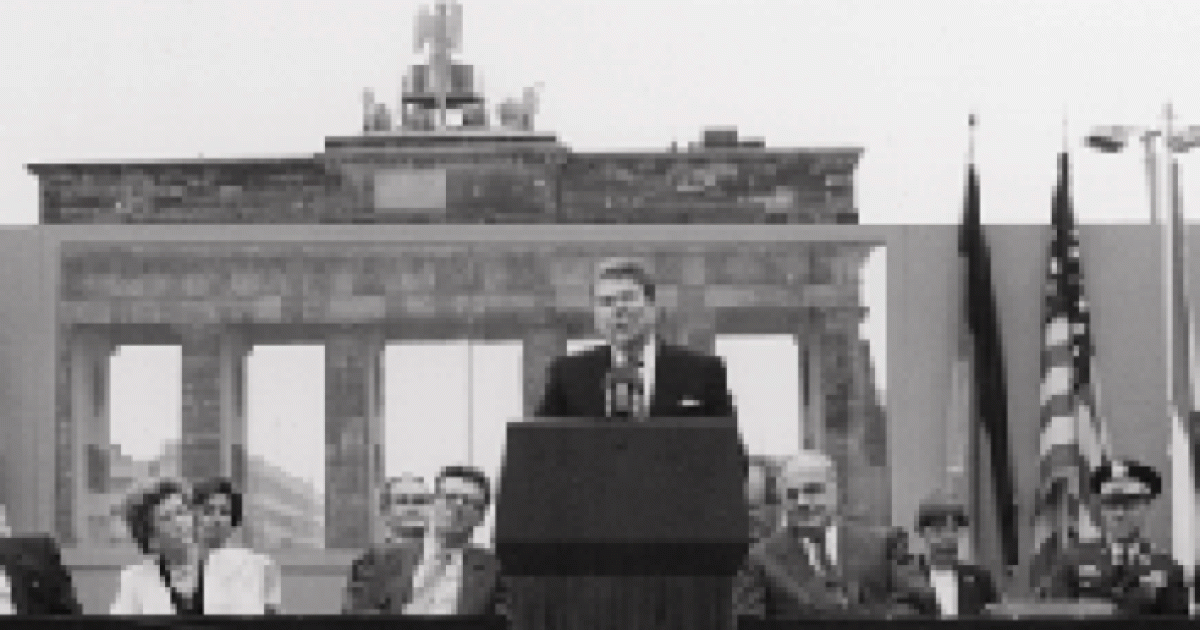- Contemporary
- The Presidency
- History
- Politics, Institutions, and Public Opinion
Last summer, a television producer wanted to interview me for a piece on the tenth anniversary of President Reagan's address at the Berlin Wall, a speech I drafted. We met at the Ronald Reagan Presidential Library in Simi Valley, California, so the crew could film the interview in front of the actual documents. I was looking forward to seeing the papers after a decade: my two drafts and the dozens of revisions and alternative drafts that circulated when the State Department and the National Security Council (NSC) responded with such contempt and vehemence to what I had written. That was the purpose of presidential libraries, after all, to keep intact the history of small but important aspects of the administrations whose papers they house.
No such luck. Two thick files were present, each containing dozens of pages, but they were the files assembled by the researcher who worked with me on the speech. They showed a great deal of what had taken place--I had forgotten that one NSC staffer had so objected to several pages that he had meticulously lined out every word. But my own file--the file with my notes, my first draft, and my comments on each of the subsequent drafts--was missing. "It never got shipped from the White House to the archives," a member of the library staff said.
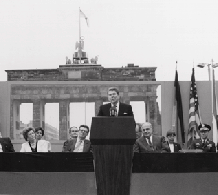
In the library's small amphitheater, an older couple sat alone among the rows of benches, seeing a short film: President Reagan appears on a blue platform; behind him, through a big plexiglass window, you can see the Berlin Wall. Above him tower the pillars of the Brandenburg Gate. The president fixes his jaw. He speaks with controlled but genuine anger--shortly before delivering the speech he had learned that in East Berlin, on the other side of the Wall, a crowd had assembled to hear him, only to be dispersed by the police. He enunciates his words deliberately, so that the last four words, each a monosyllable, sound like hammer blows: "Mr. Gorbachev, tear down this Wall!"
The work I did on the speech was the most notable of my professional life. It proved a monumental struggle to get to the point at which President Reagan could speak those words that seemed fanciful even at the time I wrote them--words that would come gloriously true two and a half years later (even if it wasn't Mikhail Gorbachev doing the tearing down). The Berlin Wall address is merely one of half a dozen or more Reagan speeches that even now remain important--the Westminster address, the "evil empire" speech, the address at Moscow State University. But historians will have difficulty getting the story of the Berlin Wall address right, and not only because documents have disappeared. Ever since the Wall came down, people in and around the government in those days have sought credit in part or full for the speech. In Europe, recent articles have attributed it to John Kornblum, a career foreign service officer, now ambassador designate to Germany, who actually fought it tooth and nail.
Kornblum didn't write it. And, in some very important ways, I didn't write it either. The key phrase came from a woman I met at a dinner party, and the phrase remained in the speech solely because of Ronald Reagan.
In May 1987, when I was assigned the task of drafting the speech, Queen Elizabeth had already visited Berlin on the occasion of its 750th anniversary, and Gorbachev was due in a matter of days. All I had been told back in Washington was that the president would deliver the speech in front of the Wall and that he would be expected to speak for about thirty minutes. In Berlin for a day and a half with the White House advance team, I needed material, and I had my notebook ready when I met Kornblum, the ranking American diplomat in the city.
Kornblum, a stocky man with thick glasses, appeared impatient. He spoke rapidly. He kept looking up, as though searching the room for a more important member of the advance party with whom to speak. His comments ran roughly as follows:
Berlin is the most left leaning of all West German cities. Be sophisticated. Don't let Reagan bash the Soviets. Don't mention the Wall. Berliners have gotten used to it. Mention American efforts to persuade the East Germans to permit more air routes into West Berlin. Talk about American support for West Berlin's bid to host the Olympics.
Here in Berlin, where the conflict between the communist world and the West was at its most visible, Kornblum was saying, President Reagan should talk only about a grab bag of minor diplomatic initiatives.
That evening I had dinner with a dozen or so West Berliners at the home of Dieter Elz, a retired World Bank official. I was the only American present, and I related what Kornblum had told me. "Is that true? Have you gotten used to the Wall?"
| On the very morning Air Force One left for Berlin, there was a last effort to block the speech. |
There was a silence. The West Berliners looked at one another, as if deciding who would go first. Then one man spoke. "My sister lives twenty miles in that direction," he said, pointing with an outstretched arm, "but I haven't seen her in more than two decades. Do you think I can get used to that?" Another man spoke. On his way to work, he explained, he passed a guard tower. The same soldier peered down at him through binoculars each morning. "He speaks the same language I speak. He shares the same history. But one of us is an animal, and the other is a zookeeper, and I am never quite certain which is which." Our hostess, Frau Elz, broke in. She was a gracious, pleasant woman, probably in her mid-fifties, but she was angry. She made a fist of one hand and slapped it into the palm of the other. "If this man Gorbachev is serious with his talk of glasnost and perestroika, he can prove it. He can get rid of this Wall."
Back in the office, I adapted Frau Elz's comment about Gorbachev, making it the central passage of the speech. Two weeks later, after two drafts, the speechwriters joined President Reagan in the Oval Office. Tom Griscom, the director of communications, asked the president for his comments on the Berlin speech. The president said simply that he liked it. Griscom nodded to me.
"Mr. President," I said, "I learned in Germany that your speech will be heard by radio throughout East Germany. Depending on weather conditions, it might even be heard as far east as Moscow. Is there anything you want to say to people on the other side of the Berlin Wall?"
"Well, there's that passage about tearing down the Wall," Reagan said. "That Wall has to come down. That's what I'd like to say."
The speech was circulated to the State Department and the NSC three weeks before it was to be delivered. For three weeks, State and the NSC fought the speech. They argued that it was crude. They claimed that it was unduly provocative. They asserted that the passage about the Wall amounted to a cruel gimmick, one that would unfairly raise Berliners' hopes. There were telephone calls, memoranda, and meetings. State and the NSC submitted their own alternative drafts--as best I recall, there were seven--one of them composed by Kornblum. In each, the call for Gorbachev to tear down the Wall was missing.
This presented Tom Griscom with a problem. On the one hand, he had objections to the speech from virtually the entire foreign policy apparatus of the U.S. government. On the other, he had Ronald Reagan. The president liked the speech. Griscom had heard him say so. The president especially liked the passage about tearing down the Berlin Wall, the very part of the speech to which the foreign policy experts were most vehemently opposed. If that passage had to come out, it would be Griscom's job to explain to Reagan why.
The week before the president's departure, the battle reached a pitch. Every time State or the NSC registered a new objection to the speech, Griscom summoned me to his office, where he had me tell him, one more time, why I was convinced State and the NSC were wrong and the speech, as I had written it, was right. (On one of these occasions, Colin Powell, then national security adviser, was waiting in Griscom's office for me. I held my ground as best I could.) Griscom was evidently waiting for an objection that he believed Ronald Reagan himself would find compelling. He never heard it. When the president departed for the Venice summit, he took with him the speech I had written.
On the very morning Air Force One left Venice for Berlin, the State Department and the National Security Council made a last effort to block the speech, forwarding yet another alternative draft. Griscom chose not to take it to the forward cabin. Air Force One landed. Hours later, President Reagan delivered his speech.
There is a school of thought that Ronald Reagan managed to look good only because he had clever writers putting words into his mouth. (Perhaps the leading exponent is my former colleague Peggy Noonan, who while a Reagan speechwriter appeared in a magazine article under a caption that said just that: "The woman who puts the words in the president's mouth.") There is a basic problem with this view. Jimmy Carter, Walter Mondale, George Bush, and Bob Dole all had clever writers. Why wasn't one of them the Great Communicator?
Because we, his speechwriters, were not creating Reagan; we were stealing from him. Reagan's policies were straightforward--he had been articulating them for two decades. When the State Department and the National Security Council began attempting to block my draft by submitting alternative drafts, they weakened their own case. Their drafts lacked boldness. They conveyed no sense of conviction. They had not stolen, as I had, from Frau Elz--and from Ronald Reagan.
Photograph courtesy of the Ronald Reagan Library.








